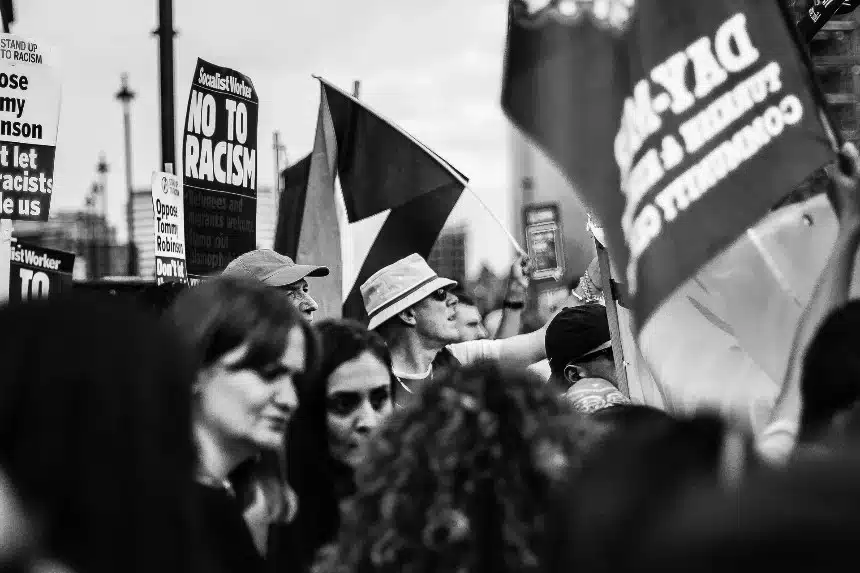The landscape of British social activism is profoundly marked by the historical interplay of anti-fascist movements, representing a critical response to the rise of fascist ideologies in the 20th century. These movements, diverse in their composition and strategies, emerged as a formidable force against the backdrop of escalating racial and political tensions.
Central to their mission was the combat against groups like the National Front, which were gaining prominence with their extremist views. This article delves into the intricacies of these movements, exploring their evolution from street-level protests to more organized political activism.
A key focus is the significant role of the Black community, whose involvement signified a pivotal shift towards a more confrontational approach in anti-fascist actions. This era of activism was not just about opposing fascism in isolation; it was intricately tied to the broader struggle against racism and state-sponsored discrimination.
The Rise of Anti-Fascism in Britain
In the 1970s, Britain’s socio-political climate was significantly influenced by the emergence of fascist ideologies, notably propagated by groups like the National Front (NF). This period marked the genesis of various anti-fascist movements, characterized by their diversity in ideology and methodology. These movements ranged from grassroots activists engaging in direct confrontations with fascist groups to political advocates lobbying against the institutional spread of fascism.
By integrating anti-fascist efforts with a broader anti-racist agenda, movements can more effectively combat the intertwined issues of racial injustice and fascist ideologies.
Key to understanding these movements is recognizing their varied composition. They were not a single, unified entity but rather a coalition of disparate groups united by a common goal: to challenge and dismantle the growing influence of fascist ideologies in Britain. This diversity in approach and membership was both a strength and a source of internal debate. While some factions focused on street-level activism, others believed in the power of political discourse and legislative change.
A significant aspect of these movements was their response to the NF’s activities. The NF, having gained a troubling foothold in British politics, became the primary target for these anti-fascist groups. The strategies adopted to counter the NF’s influence were multifaceted, ranging from organizing counter-demonstrations to launching public awareness campaigns. These efforts were not without challenges, as they often led to violent confrontations, raising questions about the effectiveness and ethical implications of such direct action.
Another notable feature of this period was the involvement of the labor movement and leftist political parties. Their contribution brought an additional layer of organization and political influence, expanding the reach and impact of anti-fascist efforts. These groups played a critical role in mobilizing public opinion against the NF, often aligning their anti-fascist stance with broader social justice campaigns.
The rise of anti-fascism in Britain during the 1970s was a complex and multi-dimensional phenomenon. It brought together a diverse array of individuals and groups, each contributing to a collective effort against the spread of fascism. The movements’ strategies, while varied, shared a common objective: to confront and curb the growing influence of fascist ideologies in British society. Their legacy, marked by both successes and challenges, offers important insights into the dynamics of social activism and political resistance.
Black Community’s Response and Anti-Nazi League
The involvement of Britain’s Black community in anti-fascist movements marked a significant evolution in the fight against fascism and racism. This period, epitomized by events such as the Battle of Lewisham, saw the Black community assertively counteracting the National Front’s (NF) racist and fascist propaganda. The Battle of Lewisham, in particular, stands out as a watershed moment. It not only demonstrated the Black community’s resilience but also catalyzed a shift towards a more confrontational form of anti-fascism.
This assertive stance against fascism led to the formation of the Anti-Nazi League (ANL). The ANL, emerging as a prominent player in the anti-fascist movements, aimed to unite various groups under a common banner to oppose the NF and similar organizations. It garnered significant support from a diverse spectrum of society, including trade unions, political parties, and cultural figures. This broad-based support was instrumental in amplifying the League’s anti-fascist message and activities.
However, the ANL’s approach and focus were not without criticism. Some argued that while it effectively mobilized against the NF, it sometimes inadvertently overshadowed the specific racial issues faced by minority communities. This critique highlights a recurring challenge within anti-fascist movements: balancing the fight against fascism with the need to address the underlying and interconnected issues of racism and discrimination.
Moreover, the Black community’s active participation in these movements brought to the fore the necessity of acknowledging and incorporating racial dynamics into anti-fascist strategies. It emphasized the need for a more nuanced approach that not only combats fascist ideologies but also addresses the systemic injustices that give rise to such ideologies.
The Black community’s response and the formation of the Anti-Nazi League were pivotal in shaping the trajectory of anti-fascist movements in Britain. Their contributions underscored the importance of inclusivity and intersectionality in anti-fascist efforts. By highlighting the interconnectedness of anti-fascism and anti-racism, they laid the groundwork for more comprehensive and effective social activism against fascism and racial injustice.
Intersection of Anti-Fascism and Anti-Racism
The relationship between anti-fascist movements and anti-racism in Britain presents a complex and layered narrative. While these movements were united in their opposition to fascist ideologies, their approaches to combating racism varied significantly. This variance stemmed from differing perspectives on how best to integrate anti-fascist efforts within the broader framework of fighting racism and state-sponsored discrimination.
One key aspect of this intersection was the debate over the scope and focus of anti-fascist actions. Some groups within the anti-fascist movements advocated for a comprehensive approach, arguing that the fight against fascism should be part of a larger struggle against all forms of racial discrimination. This perspective was grounded in the belief that fascism and racism were deeply interconnected, and addressing one required confronting the other.
On the other hand, certain factions focused more narrowly on the immediate threat posed by specific fascist groups. This approach often involved direct confrontations with groups like the National Front and prioritized immediate, tangible actions against fascist activities. However, this focus sometimes led to criticisms that these factions were neglecting the broader, systemic issues of racism that underpinned fascist ideologies.
The diversity of strategies within the anti-fascist movements also reflected varying understandings of racism itself. While some factions recognized the complexity of racial politics in Britain and the need for a multifaceted response, others were criticized for a more limited view that underestimated these complexities. This difference in understanding influenced the movements’ tactics and their overall effectiveness in addressing both fascism and racism.
The interplay between anti-fascist movements and anti-racism highlights the challenges of aligning diverse strategies and goals. It underscores the importance of a comprehensive approach that acknowledges the multifaceted nature of racism and fascism. By integrating anti-fascist efforts with a broader anti-racist agenda, movements can more effectively combat the intertwined issues of racial injustice and fascist ideologies.
Critiques and Evolution of Anti-Fascist Movements
The evolution of anti-fascist movements in Britain during the 20th century was marked by both significant achievements and notable critiques. These movements, while pivotal in countering fascist ideologies, faced challenges in their strategies and their understanding of the complexities of racial politics.
A primary critique of these movements was their sometimes limited approach to racism. While effectively mobilizing against fascist groups, certain factions within the anti-fascist movements were criticized for a somewhat narrow focus that primarily addressed overt fascist threats. This approach occasionally overlooked the deeper, systemic issues of racism, failing to address the broader spectrum of racial injustice in Britain.
Furthermore, the evolution of these movements was shaped by internal debates about the most effective strategies to combat fascism. Some factions emphasized direct action and confrontation, while others advocated for a more nuanced approach that included educational campaigns and political lobbying. These differing tactics sometimes led to divisions within the movements, reflecting the challenge of maintaining a united front against a common enemy.
Additionally, the movements’ efforts to incorporate a broader anti-racist agenda were met with varying degrees of success. Efforts to align anti-fascist goals with broader anti-racist objectives highlighted the need for a deeper understanding of the intersectionality of these issues. The movements’ evolution thus involved a continuous process of self-reflection and adaptation, as they sought to respond to the changing dynamics of fascism and racism in British society.
The critiques and evolution of anti-fascist movements in Britain underscore the complexities involved in combating fascism and racism. These movements, while instrumental in challenging fascist ideologies, grappled with the need to develop more comprehensive strategies that addressed the multifaceted nature of racial injustice. Their journey offers valuable lessons for contemporary social activism, emphasizing the importance of adaptability, inclusivity, and a deep understanding of the issues at hand.
Legacy and Contemporary Relevance of Anti-Fascist Movements
The legacy of anti-fascist movements in Britain extends far beyond their immediate impact in countering fascist groups. These movements have played a crucial role in shaping the discourse on racism and social justice, leaving an indelible mark on British society and politics. Their historical significance is mirrored in their enduring relevance in contemporary times, especially considering the ongoing challenges of racism and the resurgence of far-right ideologies.
One of the key legacies of these movements is the heightened awareness and understanding of the dangers posed by fascist ideologies. Through their actions, anti-fascist movements brought to public attention the threats that such ideologies posed to a democratic and inclusive society. They also highlighted the need for vigilance and continuous activism to safeguard against the resurgence of fascism.
Moreover, these movements have had a lasting impact on the strategies and tactics employed in social activism. The lessons learned from their successes and shortcomings continue to inform contemporary anti-fascist and anti-racist efforts. This includes an increased emphasis on intersectionality, recognizing the interconnected nature of various forms of oppression and discrimination.
In the contemporary context, the resurgence of far-right groups and ideologies has made the lessons from these historical movements more relevant than ever. Today’s anti-fascist groups face similar challenges, navigating a complex socio-political landscape and striving to counteract the spread of extremist ideologies. The historical perspective offered by the legacy of past movements provides valuable insights into developing effective strategies for today’s activists.
In conclusion, the legacy of anti-fascist movements in Britain serves as a powerful reminder of the importance of continuous and informed activism in the fight against fascism and racism. Their historical journey offers lessons in resilience, adaptability, and the critical need for a comprehensive approach to combatting social injustices. As society faces new and evolving challenges, the relevance of these movements remains as significant today as it was in the past.
Adapted from an academic article for a wider audience, under license CC BY 4.0









